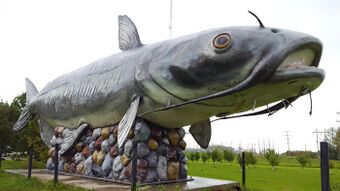Biology:Wahpper
| Wahpper | |
|---|---|
 Wahpper in 2017 | |
| Artist | Dave Oswald |
| Year | 1997 |
| Subject | channel catfish |
| Dimensions | 40 feet (12 m) long x 12 feet (3.7 m) high |
| Weight | 50,000 pounds (23,000 kg) |
"Wahpper" is a 40-foot long fiberglass sculpture of a catfish beside the Red River of the North in Wahpeton, North Dakota, United States.
[ ⚑ ] 46°17′20″N 96°35′49″W / 46.28889°N 96.59694°W
Description and history
Wahpper can be found at the north end of Wahpeton, on the banks of the Red River within the Kidder Dam Recreation Area.[1] The sculpture is 40 feet long, 12 feet tall (including its pedestal) and weighs more than 5,000 pounds.[1]
Wahpeton's Visitor's Committee (now the Convention and Visitors Bureau) viewed a giant sculpture as a good way to market the town and its natural resources.[2] The Red River is formed by the Bois de Sioux and Otter Tail Rivers, and the headwaters is in Wahpeton; people come from multiple states to fish the river's abundant channel catfish.[2] $12,000 was raised to create the sculpture, which was raised by multiple organizations, including the Wahpeton Visitors Committee, the Wahpeton Park Board, and local businesses.[2] It was placed at the site on August 3, 1997, with a opening celebration that included serving catfish to guests.[2]
The artist was Dave Oswold, the same sculptor that created other fiberglass creations such as Salem Sue in New Salem, North Dakota and the 143-foot long sculpture of a muskie at the National Fresh Water Fishing Hall of Fame in Hayward, Wisconsin.[2][3] The Wahpeton sculpture is credited as the world's largest sculpture of a catfish,[2] however, there is a larger catfish statue in Dunnville, Ontario standing at 50 feet long and 27 feet high.[4] The fish's name, "Wahpper," is a playful nod towards a very big fish, or a "whopper," combined with the town's name.[2] During the river's spring flooding, the sculpture is surrounded by water, giving the impression the fish is swimming.[1][5]
References
- ↑ 1.0 1.1 1.2 Vatnsdal, Emma (16 June 2019). "Unique roadside attractions, including geographical center of North America, are just a short drive away". West Fargo Pioneer. https://www.westfargopioneer.com/lifestyle/travel/2410820-Unique-roadside-attractions-including-geographical-center-of-North-America-are-just-a-short-drive-away. Retrieved 31 July 2020.
- ↑ 2.0 2.1 2.2 2.3 2.4 2.5 2.6 Betz, Katie (1 June 2019). "A 'Wahpper' of a tale". Daily News (Wahpeton, North Dakota). https://www.wahpetondailynews.com/news/a-wahpper-of-a-tale/article_5951c58a-83dc-11e9-a54d-2b1dd46f395f.html. Retrieved 31 July 2020.
- ↑ Grantier, Virginia (24 September 2004). "How now, black and white cow?". Bismarck Tribune. https://bismarcktribune.com/news/local/how-now-black-and-white-cow/article_9a7a58b3-f699-5064-b7f3-c65fec5c2dc2.html. Retrieved 31 July 2020.
- ↑ "Dunnville Mudcat". https://dunnvillemudcat.home.blog/. Retrieved 31 March 2023.
- ↑ "Wahpeton, North Dakota: World's Largest Catfish". https://www.roadsideamerica.com/tip/836. Retrieved 31 July 2020.
 |

